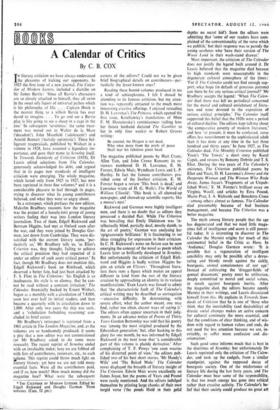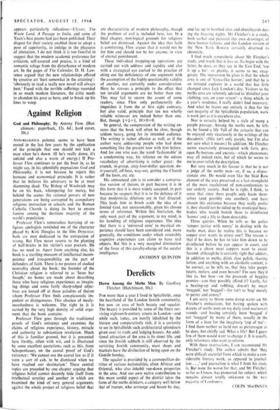A Calendar of Critics
Han
By C. B. COX
IN literary criticism we have always understood the pleasures of kicking our opponents. In 1925 the first issue of a new journal, The Calen- dar of Modern Letters, included a diatribe on Sir James Barrie: `Since all Barrie's characters are so closely attached to himself, they all swim in the sweet oily liquor of universal pathos which is his philosophy of life. . . . Captain Hook is the nearest thing to a villain Barrie has ever dared to imagine. . . . To go and see a Barrie play is like going to see a- sheep in a cage in the zoo.' In subsequent 'scrutinies,' the same treat- ment was meted out to Walter de la Mare ('decadent'), John Masefield ('adolescent') •and Arnold Bennett ('naively optimistic'). These bel- ligerent reappraisals, published by Wishart in a volume in 1928, have assumed a legendary im- portance, and gave their name to Scrutiny itself. In Towards Standards of Criticism (1933), Dr Leavis edited selections from The Calendar, generously acknowledged his debt, and argued that in its pages new standards of intelligent criticism were emerging. The whole magazine, which lasted only from 1925 to 1927, has now been reprinted in three fine volumes,* and it is a considerable pleasure to leaf through its pages, trying to discover what its young contributors believed, and what• they were so angry about.
In a retrospect, which prefaces the new edition, Malcolm Bradbury recounts how the magazine was the project of a loosely-knit group of young writers feeling their way into London literary journalism. Two of them, Edgell Rickword and Bertram Higgins, had met at Oxford soon after the war, and they were joined by Douglas Gar- man, just down from Cambridge. They were dis- satisfied with the current literary scene, 'par- ticularly so,' Mr Bradbury tells us, 'as Eliot's Criterion was, they thought, failing to achieve the critical precision they had expected of it under an editor of such acute critical power.' In fact, though Mr Bradbury does not mention this, Edgell Rickword's book on Rimbaud, which deserved a better fate, had just been attacked by F. S. Flint in The Criterion: `his English is so inadequate, his style is so clumsy, that he can- not be read without a constant irritation.' The Calendar, financially backed by Ernest Wishart, began as a monthly with a circulation of 7-8,000, soon lost over half its initial readers, and then became a quarterly with its circulation down to 1,000. After only two years the ship was sunk, and a `valediction forbidding mourning' con- cluded its brief career.
Mr Bradbury's retrospect is reprinted from a 1961 article in The London Magazine, and, as the volumes are so handsomely produced, it seems a pity that a new editor was not commissioned (or Mr Bradbury asked to do some more research). The recent reprint of Scrutiny ended with an invaluable index; here we are fobbed off with lists of contributors, reviewers, etc., to each yolume. This reprint could throw much light on literary history; yet here we are not told many essential facts. Were all the contributors paid, and if so, how much? How much money did the magazine lose? What were the subsequent * THE CALENDAR OF MODERN LETTERS. Edited by Edge!! Rickword and Douglas Garman. Three volumes. (Cass, 12 gns.) careers of the editors? Could not we be given brief biographical details on contributors—par- ticularly the lesser-known ones?
Reading these bound volumes produced in me a kind of schizophrenia. I felt I should be attending to its famous criticism, but my atten- tion was repeatedly attracted to the much more interesting creative offerings. I enjoyed rereading D. H. Lawrence's The Princess, which opened the first issue, Koteliansky's translations of Mme F. M. Dostoievsky's reminiscences (telling how her future husband dictated The Gambler to her in only four weeks) or Robert Graves writing : Be assured, the Dragon is not dead, Who once more from the pools of peace Shall rear his fabulous green head.
The magazine published poems by Hart Crane, Allen Tate, and John Crowe Ransom; its re- viewers numbered D. H. Lawrence, E. M. Forster, Edwin Muir, Wyndham Lewis and L. P. Hartley. In fact the famous contributors pro- vided some of the liveliest criticism. E. M. Forster began a review 'This book is dead,' and Lawrence wrote of H. G. Wells's The World of William Clissold: 'This book is all chewed-up newspaper, and chewed-up scientific reports, like a mouse's nest.'
Rickword and Garman were highly intelligent men, and there is no doubt that as editors they possessed a decided flair. While The Criterion was bewailing that Emily Dickinson was `in- tellectually blind, partially deaf, mostly dumb, to the art of poetry,' Garman was analysing her 'epigrammatic brilliance.' It is fascinating to see ideas struggling for expression in their criticism. In C. H. Rickword's notes on fiction can be seen emerging the concept of the novel as poem which Leavis later so brilliantly developed in Scrutiny. But unfortunately the criticism of Edgell Rick- word and Higgins is badly written. Higgins be- gins an article on Ulysses: 'Throughout litera- ture there runs a figure which makes an appeal different in kind from the rest of the literary creation by approaching an identity in its various manifestations.' Even Leavis was forced to admit that `the characteristic fault of The Calendar's critical writing may be described as corrugation —excessive difficulty. In determining, with severe effort, what the author meant, one may find, rather too often, clearer ways of saying it.' The editors often appear uncertain in their judg- ments. In an advance notice of Poems of Thirty Years Gordon Bottomley was told that his poetry was 'among the most original produced by the Edwardian generation,' but, after basking in this glory for one month, he was informed by Edgell Rickword in the next issue that `a considerable part of this volume is plainly derivative.' After complaining of T. F. Powys `one soon wearies of his distorted point of view,' the editors pub- lished two of his best short stories, `Mr Handy's Wife' and 'The Baked Mole.' The Calendar never displayed the-breadth of literary insight of The Criterion. Edwin Muir wrote excellently on James Joyce, but the poems of Yeats and Pound were rarely mentioned. And the editors indulged themselves by Printing largo chunks of their own turgid verse ('the' ponds Hold in their gelid depths no secret hid'). Soon the editors were admitting that 'some of our readers have com- plained of the conventionality of the verse which we publish,' but their response was to parody the" young aesthetes who `have their version of The Waste Land in their wash-stand drawer.'
Most important, the criticism of The Calendar does not justify the legend built around it. Dr Leavis believed that the magazine died because its high standards were unacceptable in the degenerate cultural atmosphere of the times 'For if The Calendar could not find enough sup- port, what hope (in default of generous patrons) can there be for any serious critical journal?' Mr Bradbury accepts the legend: 'When The Caleri- dai died there was left no periodical concerned for the moral and cultural enrichment of litera- ture and none devoted to the exposition of serious critical principles.' The Calendar itself supported this belief that the 1920s were a period of cultural decline. The editors kept talking about 'the comparative poverty of modern literature,' and how `at present, it must be confessed, verse offers less nourishment to the sophisticated adult than it has done at any time -in the last three hundred and thirty years.' In June 1927, as The- Calendar died, The Monthly Criterion published Yeats's The Tower,' a short story by Karel Capek, and reviews by Bonamy Dobree and T. S. Eliot. During the two years of The Calendar's existence, The Criterion published poems by Eliot and Yeats, D. H. Lawrence's Jimmy and the Desperate Woman and The Woman Who Rode Away, James Joyce's 'Fragments of an Unpub- lished Work,' E. M. Forster's brilliant essay on Virginia Woolf, and articles by Ezra Pound, Mario Praz, I. A. Richards and Benedetto Croce —among others almost as famous. The Calendar died presumably because of bad business management, and because The Criterion was a better magazine.
The myth among literary people that the age has degenerated and that we need little maga- zines full of intelligence and scorn is still power- ful today. It is interesting to discover in- The Calendar the Marxist origins for much of this- sentimental belief in the Critic as Hero. In 'Audience,' Douglas Garman wrote: 'It is possible that a regeneration of intelligent sensibility may only be possible after a devas- tating and bloody revolt against the sickly, bourgeois, animal consciousness of our age.' Instead of cultivating the `drugget-fields of genteel discontent,' poetry must be utilitarian; deeply committed to moral and social values, in revolt against bourgeois inertia. After the magazine died, the editors became openly Marxist in their writings, and Leavis dissociated himself from this. He explains in Towards Stan- dards of Criticism that he is one of 'those who think that the inevitability (and desirability) of drastic social changes makes an active concern for cultural continuity the more essential, and that the conditions of clear thinking, and of wis- dom with regard to human values and ends, do not need the less attention because we are, in- evitably, to suffer more confusion and dis- orientation.'
Such good sense informs much that is best in the doctrines of Scrutiny; but unfortunately Dr Leavis reprinted only the criticism of The Calen- dar, and took up the cudgels, from a -similar standpoint, against the supposed decay of bourgeois society. One of the misfortunes of literary life during the last forty years, and The Calendar must bear some of the responsibility, is that too much energy has gone into critical rather than creative activity. The Calendar's be- lief that their society cbuld produce no great art appears particularly ridiculous—Ulysses, The Waste Land, A Passage to India, and some of Yeats's best poems had just been published. Their • disgust for their society enabled them to adopt a pose of superiority, to indulge in the pleasures of alienation. I do not think it is too fanciful to suggest that the modern academic preference for criticism, self-assured and precise, is 2 kind of romantic refuge from the disturbance of modern art. In the pages of -The Calendar, D. H. Law- rence argued that the new relationships offered by creative art 'hurt somewhat in the attaining': 'obviously to read a 'really new novel' will always hurt.' Faced with the terrible sufferings recorded in so much modern literature, the critic needs to abandon his pose as hero, and to break up his lines to weep.































 Previous page
Previous page